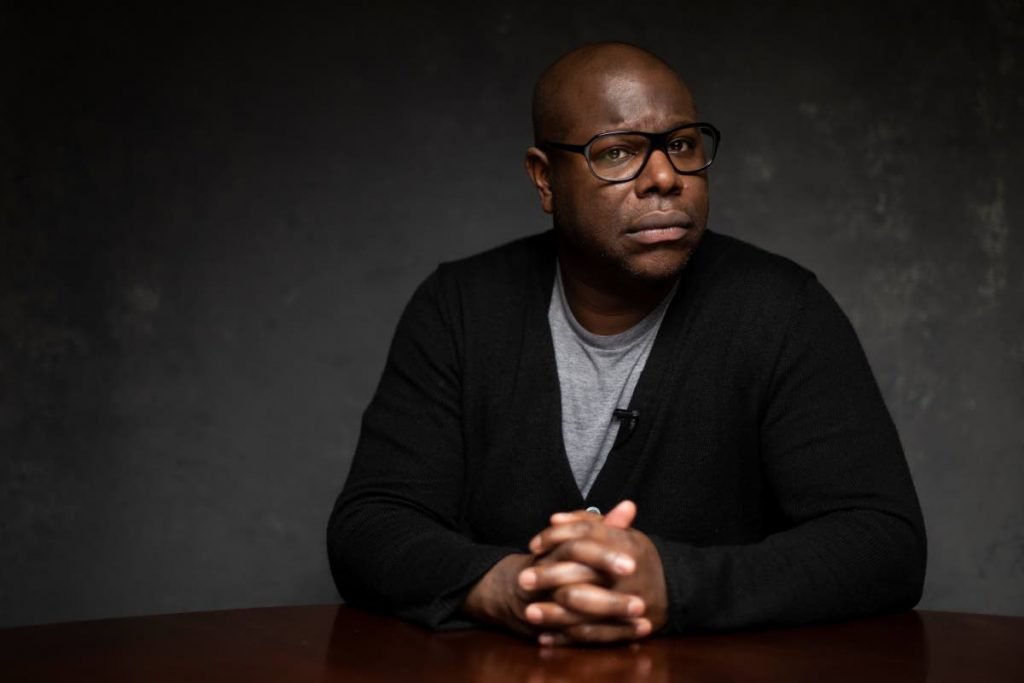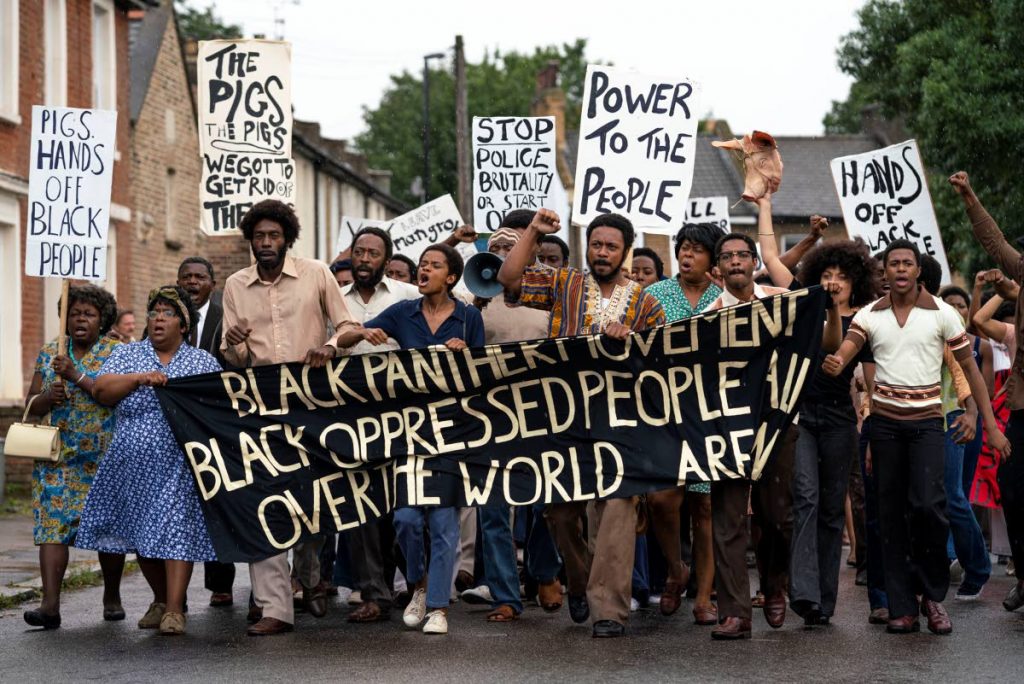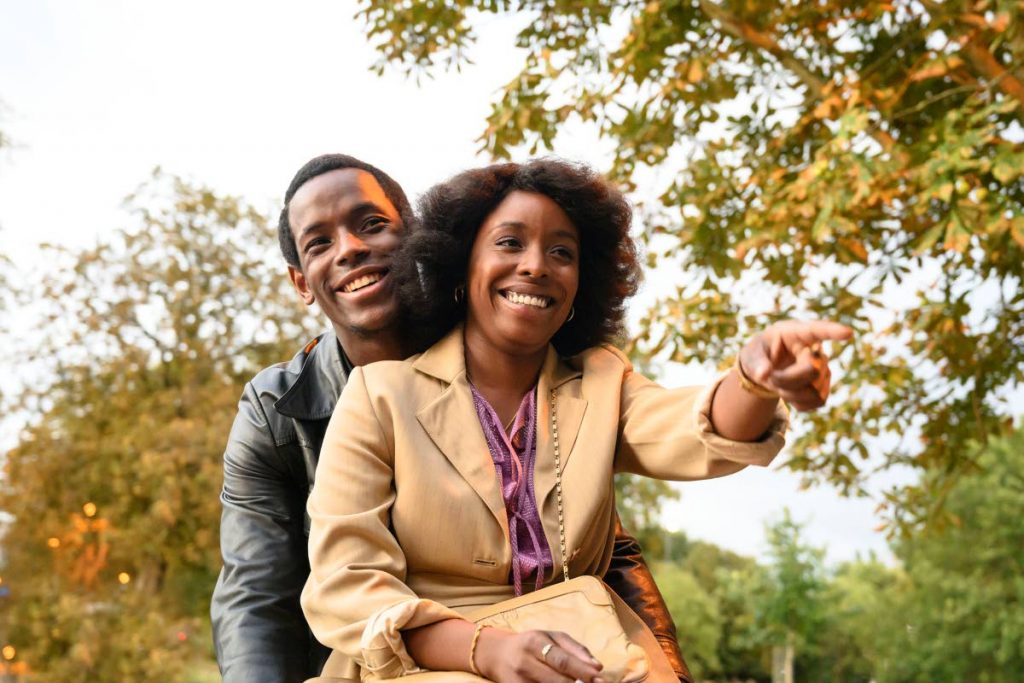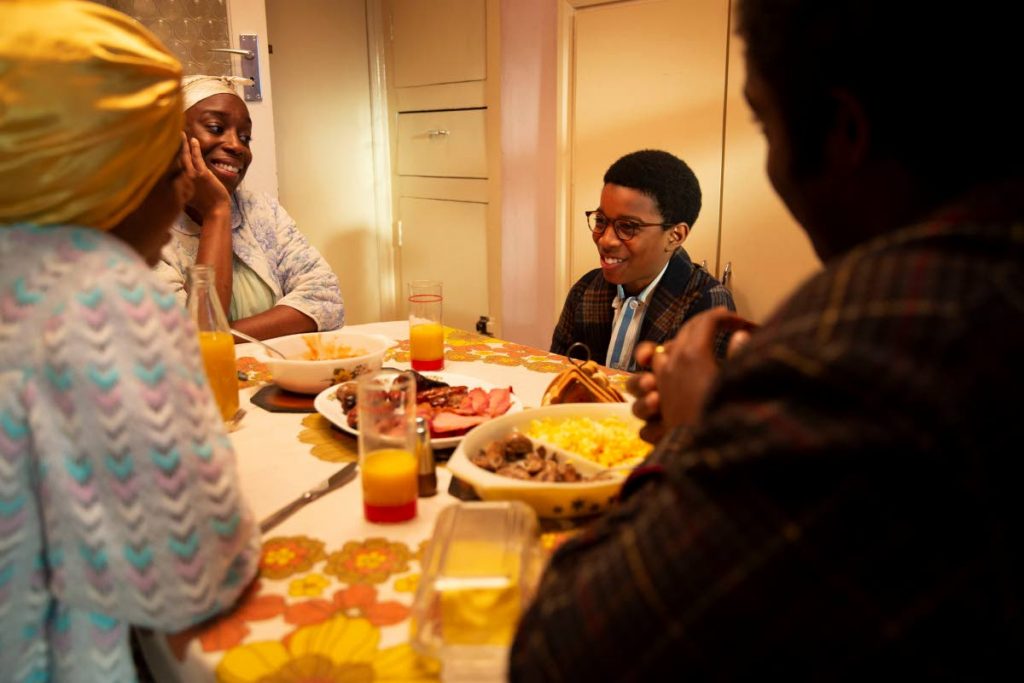Oscar-winner Sir Steve McQueen: Small Axe tells the story of West Indians in 1970-80s London

Kiran Mathur Mohammed
The first thing you notice about Sir Steven McQueen is that he thinks and speaks at a clip his racing driver namesake would struggle to match; thoughts one pace ahead of his voice.
The Oscar, Cannes and Turner Prize winning artist and filmmaker remains impatient to tell stories that might have otherwise been lost in the margins of history. That has meant putting pictures of war-dead on postage stamps, as the UK’s official war artist, or exploring overlooked and uncomfortable narratives, whether an Irish political hunger strike (Hunger), sex addiction (Shame) or that of a freedman escaping kidnapping and slavery (Twelve Years a Slave).
Now he’s telling our story. Sir Steven is a local boy made good. He has not forgotten us.
For the director, who was raised in London by a Trinidadian mother and Grenadian father, his latest work Small Axe, a mini-series about the West Indian experience amidst the turmoil of Britain in the seventies and eighties, is one he considers his most personal. This is no nostalgic set piece by a famous director, though viewers might be tempted to draw comparisons to films like Alfonso Cuaron’s Roma. Its themes of social justice feel urgent as ever.
Each film in the series is standalone, but watching in sequence allows an altogether different experience, as when the intensity of racial protest in Mangrove segues into Lover’s Rock, an impressionistic piece that charts a budding romance in a seventies reggae party. The latter is an exercise in world building, that like Jorge Luis Borges’ short stories, uses specific artefacts (in this case, the impeccable soundtrack) to draw a larger world that will resonate with viewers regardless of whether they have our advantage of a historical connection or not.

Sir Steven has worked with West Indian talent such as screenwriter Courttia Newland (who will be coming to the TT-based Bocas Literary Festival, started by Trinidadian BBC producer Marina Salandy-Brown (whose parents would certainly have never allowed her to visit a restaurant like the Mangrove). By now, Sir Steven has influenced a generation of artists. Some viewers familiar with local TT films might recognise this influence in local films like Michael Mooledhar’s Green Days by the River or Oliver Milne’s Salty Dog.
Indeed, a joint BBC and Amazon production that headlined the New York film festival, this is the first time the West Indian story is being told by an Oscar-winning director with all the grand production values that means. The BBC told me they are actively looking for a broadcast partner for the series in Latin America and the Caribbean and it should be out here soon. It is all a long way away from the time when the cult film Babylon, with reggae acts Jah Shaka and Aswad, was banned in 1979 in the US and West Indies for fear of stoking racial unrest.
Last week, I interviewed Sir Steven over video conference.
One of the biggest uncredited stars in the series was the stewed chicken. Would the recipes in Mangrove and Lover’s Rock (two of the films in the series) pass muster in the Mangrove restaurant (the West Indian restaurant in London that became a centre for racial protest in the eighties), or in your mother’s kitchen?
[Laughs loudly] Can you imagine if I got it wrong? It would have been a big problem! It was vetted. Yes, she approved – thank you very much. Trust me.
What do your parents think of the series? Have you talked to them about it?
My mother was extremely chuffed and kind of emotional, especially with Mangrove and Lover’s Rock. And my aunt was very emotional, because Lover’s Rock was based on my aunt, with my grandmother not allowing her to go to these blues parties but my uncle allowing her to sort of lead (this life), well not allowing her but basically leaving the back door open for her so she could nip off to the blues parties before church in the morning. So it’s been in general for the family emotional, but I know for the public, for the West Indian public it’s been kind of cathartic, because people have been sitting around the television on a Sunday night, with their families, and actually after the film has finished, people have been discussing things which usually haven’t been discussed. Things have been raised to the surface. In a way, that, for me has been the thing I’m most proud of. It’s kind of creating conversation.

Your stories have always been at the edge and taken an unconventional approach. I mean 12 Years A Slave was no Uncle Tom’s Cabin. Likewise, with Hunger and Shame. Do you think you can draw more out of the margins?
I think these are things in history that have been swept beneath the carpet, and where they’ve been swept beneath the carpet that’s been for a purpose, because they’ve been seen as being too dangerous, or being too controversial or being too questioning. And of course those are things that I’m drawn too, any artist would be, because you want to get to the truth, you don’t want anything to be concealed, you want everything to come out into the light, so yes, those kind of stories do attract me because often they are the ones that are the most important.
How do you select an idea and develop it?
It’s kind of one of those things that sort of hits you or doesn’t really. It’s sort of, what’s the vitality there is to it. We have a limited time on this planet, you don’t want to be wasting your time, so for me its what am I passionate about, am I willing to give up a part of my life to tell this story, so that’s what it’s about. Um, ‘cause it’s a bit of an undertaking making a film, and also it’s one of those things where you think to yourself, well is it worth it? I have to ask myself, is this a story I want to tell and why?
It’s one of those things where you have to weigh up all your options, and again, you choose one or develop one, so what’s the thing that’s in one’s consciousness right now. Also, often, these are planted a long time ago and its only now they come up into fruition, so that’s one I have to engage with now.
The seed for Small Axe, when was that planted?
A long, long time ago, longer than the 11 years it took to make, uh in a way it started way before 11 years. The process started 11 years ago, but the process took such a long time because I needed to have a distance. I needed to have the perspective on it and the maturity to have the, sort of, required knowledge to deal with these films which are very, very difficult, and to be mature, you need to be stronger because you know, how you see your parents when you are teenager, (compared to) how you see them now, that’s very different.

It’s just time. You start somewhere, but by the time you get to a certain point in your life, you have that maturity, you have that weight, you have that knowledge. Again, I can say a different perspective a different understanding of what you’re looking at, or what you’re feeling. Again, I’m a person, who is very different from how I was when I was young. I’d see my parents when I was seventeen, and see them now but be appreciating all the stuff that they’ve done for me.
What was the perspective of the 17-year-old Steve McQueen?
Goodness gracious, um huge optimism, huge excitement, but at the same time not knowing exactly how to express myself, at that age. And the best piece of advice I ever got, was: don’t take the money. Don’t go for the money, it will come, focus on what you want to do.
How does a young artist or filmmaker who may not feel they have access to the arts world get their big break? What advice do you have for them?
I think it’s a case of writing you know, because your imagination has no limits. Access to a pen or pencil is easy, and you know a camera. I would say to write, to draw, until you get the opportunity. Your story is very important, so until you get the opportunity to execute it, if you want to be a filmmaker: write, and imagine.
Have you ever been to TT? Can we hope to bring you down here when things open up?
Yes I have been, many times and will be back soon. I’m just waiting for an invitation!

Comments
"Oscar-winner Sir Steve McQueen: Small Axe tells the story of West Indians in 1970-80s London"